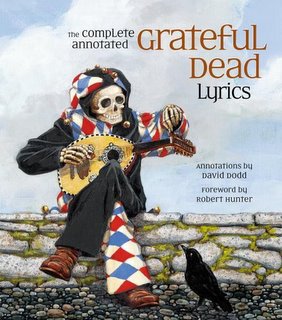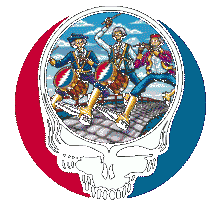Academic unravels the origin of the Grateful Dead's lyrics

From The Daily Collegian:
Academic unravels the origin of the Grateful Dead's lyrics
By John Rogers, Associated Press
LOS ANGELES - By day he was a mild-mannered, buttoned-down reference librarian. By night - and on weekends and during vacations - David Dodd would shed his jacket and tie for tie-dye and morph into a Grateful Dead fan.
He was one of those multicolored, often-bearded people who, for what seemed like endless summers, followed the band from show to show in search of its holy grail - that elusive, transcendent musical moment.
Then one day, this scholarly fellow stumbled upon the perfect union for his two passions.
Dodd, who finds great joy paging through books and microfilm or surfing the Web to determine the exact origin of phrases and expressions, decided he would annotate the recorded works of the Grateful Dead.
Ten years later, he has come out with "The Complete Annotated Grateful Dead Lyrics." The 480-page illustrated book was published by Simon & Schuster's Free Press in October. It has a lengthy foreword by the band's principal lyricist, Robert Hunter, who came out of seclusion long enough to pay Dodd the ultimate compliment: He said the researcher got it right.
"It's a lovely book," Hunter remarked from his home in Northern California. "I thumb through it and find it actually of interest. ... I had no idea that all of these things he found had affected my songs."
Annotation, a scholarly study of the origins of phrases and references of literary works, has been applied to Shakespeare and other literary giants but, as far as Dodd can determine, never to a rock band.
"I don't try to interpret the lyrics," Dodd says. "What I try to do is not to be deconstructive but to illuminate it a little bit."
Hunter, a widely read man whose musical interests encompass all styles, found numerous references in Dodd's work that could be traced to Geoffrey Chaucer, Stephen Foster, T.S. Eliot, James Joyce, American and Irish folk tales, Appalachian mountain music, science fiction writers, a food recipe, films, politics, popular culture and numerous other sources. Although he has long cited Joyce and Eliot as among his major influences, Hunter was surprised to find so many names and places referenced in his lyrics connected to their work.
The lyricist, who wrote the words for melodies composed by late lead guitarist Jerry Garcia, also was delighted to see Dodd unravel the mystery to one of his verses from "Truckin'," perhaps the Dead's most widely known song: "What in the world ever became of Sweet Jane? She lost her sparkle, you know she isn't the same. Livin' on reds, vitamin C and cocaine. All a friend can say is, 'Ain't it a shame?'"
The inspiration came not from Joyce or Eliot, but from a Pepsodent toothpaste commercial he had heard in 1948, when he was 7: "Poor Millicent, poor Millicent, she never used Pepsodent. Her smile grew dim, and she lost her vim. So, folks, don't be like Millicent. Use Pepsodent."
"And nobody ever picked up on it, and, of course, they wouldn't," Hunter said, explaining the verse was an inside joke for the band. Then, with a chuckle, he said, "So maybe these books do serve some purpose."
For Dodd, the book began as a whimsical way to pass days he already spent looking up things.
"I thought at a certain point it would be fun to write down on old library cards what this stuff was," he said by phone from the public library in San Rafael, the San Francisco Bay area suburb where he is the head reference librarian.
He wanted to decode the peculiar references in the songs he loved: Who was Sheriff Benson, who was Crazy Otto?
He traced Sheriff Benson, from the Hunter-Garcia song "Candyman," to Sheriff Benson of the Leadbelly song "Midnight Special." Crazy Otto, from the song "Ramble on Rose," was traced to two piano-playing musicians who used that nom de plume in the early 20th century.
What began as a hobby eventually blossomed into a full-fledged research project when Dodd, then a professor at the University of Colorado, learned in the mid-1990s he had to publish research if he wanted to acquire tenure.
He got the university's OK for the Grateful Dead project and soon started a Web site to track his material. He also sought help from the band, which in the beginning was lukewarm to the idea. Dodd had launched the project in 1995, the same year Garcia died and the group stopped touring under the name Grateful Dead.
Then one day, after posting "a reference to my somewhat tortured work" on the Hunter-Garcia song "Mountains of the Moon," the researcher received a cryptic e-mail from Hunter.
"I was trying to figure out who the Marsh King was," Dodd recalls, "and he just sent a line saying, 'The Marsh King's Daughter' is a story by Hans Christian Anderson.'"
The band was on board and, eventually, became enthusiastic. As guitarist Bob Weir noted: "Now I'll never have to explain myself."
Critics also have responded positively for the most part.
"Even the most hardcore Deadheads will be impressed by this obsessively complete look at the Grateful Dead's lyrics," said Publishers Weekly.
Indeed, it is so complete it took Dodd 10 years to finish it. When the 48-year-old librarian is asked about future projects, he replies that his job at the library and maintaining his Web site will suffice for now.
"I can't really imagine starting over," he says. "I would love it if somebody would do the Beatles. But it's got to be somebody else."



1 Comments:
Now that the book is out, i just hopes he keeps the website going.
I'm particularly fond of hunters essay explaining "Franklin's Tower"
http://arts.ucsc.edu/gdead/agdl/fauthrep.html
Post a Comment
<< Home